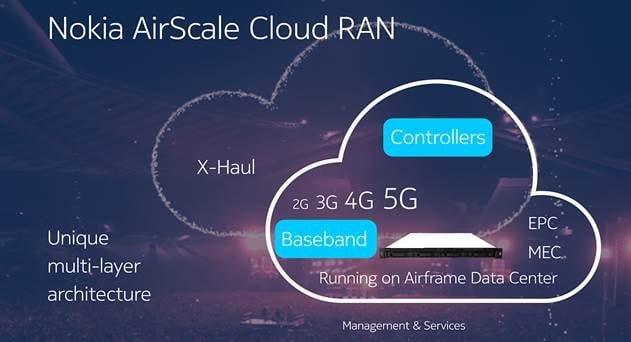Verizon is collaborating with Nokia and Intel on new Cloud RAN architectures to provide the flexibility needed for the operator's future services and requirements for 4G, 5G and IoT in the cloud.
The first milestone in developing Verizon's vRAN 1.0 architecture and path to commercialization was a successful trial of Cloud RAN in Oklahoma City, using Verizon's existing edge cloud infrastructure and the Nokia AirScale Cloud Base Station Server, featuring the Intel Xeon Scalable Processor family.
The trial furthers the joint work between Nokia and Intel to develop the next technological step of Cloud RAN, Verizon's vRAN 2.0 architecture, which will bring everything but the radio network in the cloud.
The collaborative work represents a key milestone for Verizon's cloud migration path, enabling the operator to significantly lower capital and operational expenditures for its network, and increase the number of users per cell, leading to lower costs per user. The development efforts also provide flexible and scalable capacity, plus continuous software delivery for Verizon's customers.
For the Oklahoma City trial, Nokia built the Cloud RAN software in Verizon's commercial cloud infrastructure using commercial off the shelf (COTS) hardware, proving the software is not dependent on a custom environment for deployment. Nokia used its AirScale Cloud Base Station Server, a virtual base station running on Verizon's Cloud Platform connected via Ethernet backhaul. This software defined and hardware agnostic solution retains key traits and benefits of cloud centralized RAN and edge cloud distributed RAN deployment models. As a result, real-time and non-real-time functions can be co-deployed deeper in the network.
The successful trial enables Nokia and Intel to push forward with Verizon to develop its new vRAN 2.0 architecture, which will use cloud computing capabilities that maximize efficiencies in preparation for the diverse demands of IoT and the 5G future.
Bill Stone, VPTechnology Development & Planning, Verizon
Verizon is committed to furthering innovation within the ecosystem by ensuring deployment flexibility. Verizon's Intelligent Edge Network, which maximizes this flexibility, will allow faster upgrades, allowing our customers access to the latest technology as quickly as possible.
Caroline Chan, VP and GM, 5G Infrastructure Division, Network Platforms Group, Intel
This successful trial and continued collaboration with Nokia and Verizon pushes the industry forward and demonstrates how Intel technologies and reference platforms can accelerate deployment of advanced virtualized RAN running on an open and flexible cloud architecture.




















